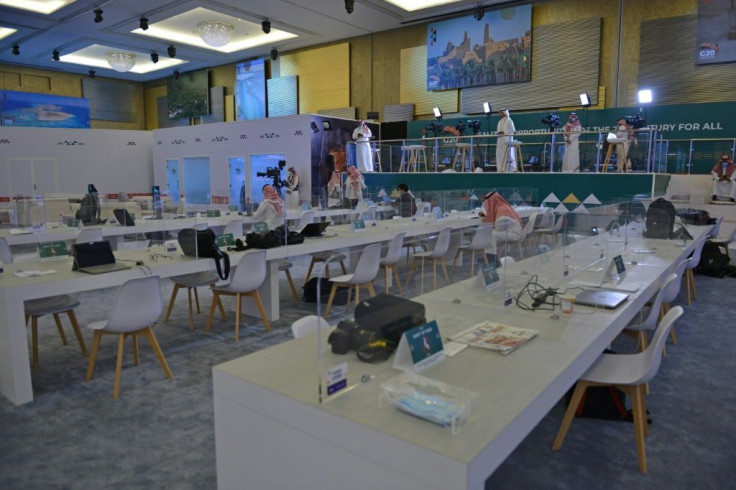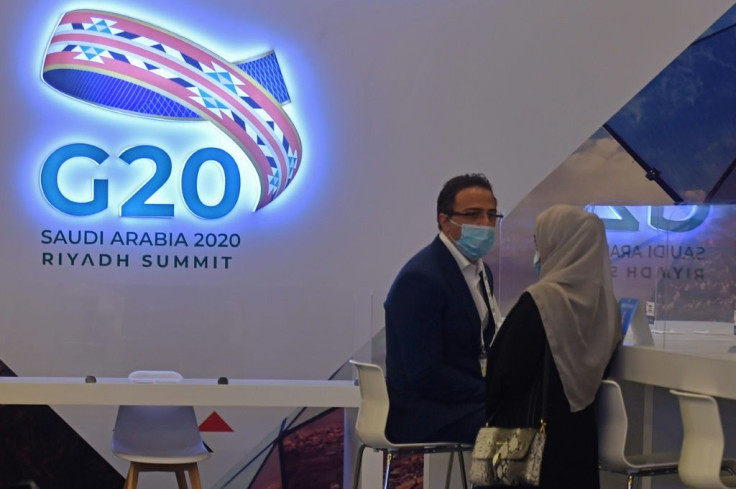Masks, Screens And Empty Chairs As Saudi Summit Goes Virtual
Mask-clad reporters filed into a Riyadh ballroom-turned-media centre Saturday after mandatory temperature checks, to cover physically a virtual G20 summit originally conceived as a grand coming-out party for host Saudi Arabia.
The media room in the capital's Crown Plaza hotel would have been buzzing with hundreds of international reporters were it not for the coronavirus pandemic that has reduced the annual gathering of world leaders into a giant webinar.
As the summit opened, the handful of foreign media present pointed their cameras to a large flickering screen where world leaders popped up in multiple tiny windows -- one shuffling papers, another seen calling for technical help and one casually chatting to an aide.
For Saudi Arabia, the first Arab nation to host the summit, the media centre -- a cavernous chandelier-studded room filled with mostly unoccupied work stations -- is emblematic of a lost opportunity to showcase its ambitious modernisation drive.
"This is an act of God," said Adel al-Jubeir, the kingdom's minister of state for foreign affairs, referring to the pandemic that made a physical summit impossible.

The austere kingdom has seen a sweeping transformation in the past three years -- a driving ban on women has been lifted, cinemas reopened and social mixing of the genders has become increasingly common as the once-feared religious police were rendered toothless.
"It would have been nice to have thousands of people come to Saudi Arabia, walk the streets, meet Saudi men and women, see the changes that have happened in the country, feel the changes," Jubeir said at a media briefing ahead of the summit.
A physical summit would also have been an opportunity to highlight the kingdom's tourism potential -- the new "white oil" the petro-state is keen to develop to diversify its revenues.
Saudi Arabia is endowed with stunning landscapes, but tourism remains a hard sell in a country with strict social codes and an absolute ban on alcohol.

Still, the government sought to make the most of the physical media centre.
Adorned with portraits of Saudi destinations, the centre could be mistaken for a tourism fair.
Liveried waiters offered four different types of Arabic coffee -- each from a different corner of the kingdom.
Coffee table books extolling Saudi culinary delights were placed next to guides on destinations such as the historic city of Al Ula and the mountain resort of Abha -- places of immense natural beauty but little known outside the country.
The kingdom hosted a media dinner on the eve of the summit in the historic town of Diriyah, close to Riyadh and known for its traditional mud-brick architecture.
Dressed in loose fitting traditional thobes and clutching daggers, dancers bobbed and swayed amid the ruins.
To highlight other government projects, journalists were offered official interviews and briefings on the sidelines of the summit that were unrelated to G20 -- including from the Saudi ministers of education and sports.
And as global campaigners sought to draw attention to the kingdom's human rights record, the government appeared determined to not let the issue overshadow the forum.
At one such briefing, investment minister Khalid al-Falih was asked if negative headlines -- including those over the grisly 2018 murder of journalist Jamal Khashoggi at Saudi Arabia's consulate in Istanbul -- had damaged investment potential.
In a country where officials are unaccustomed to tough questioning from reporters, the moderator asked the journalist to take the query elsewhere.
But Falih insisted on answering.
"Investors are not journalists, investors are looking for countries where they can place their trust in an effective government that has proper economic decision-making," he said with a shrug.






